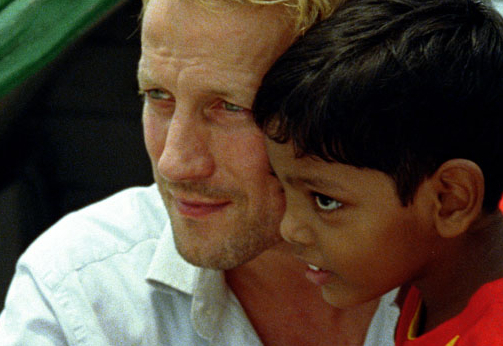This year, I gladly paid $6.99, less than the cost of a movie ticket at the theatre, for my own copy of all five of the films nominated for the Live Action Short Oscar. Collectively, they play as one video file timing out at an hour and a half. Here's what I thought of them:
1. "Pentecost"
THE PLOT: "Pentecost" is a hilarious little trifle of a film in which a young altar boy has a memorable mishap dispensing insence during an Irish Catholic mass and is banned from not only his duties but from watching his beloved football (soccer) team play in the championships. But when the Archbishop comes to their small church to say mass, the boy is called up to get a second shot at his duties.
WHAT I LIKED: In a hilarious pre-mass scene, the altar boys dress for the service in what reminds you of an athletic locker room and then are given a pep talk as if preparing for a soccer match instead of a mass.
WHAT I DISLIKED: The ending is cheap and goes for the absurd/extreme instead of realism. It's equally shocking and expected, and it's definitely unnecessary.
2. "Raju"
 STATS: From Germany/India, 24 minutes
STATS: From Germany/India, 24 minutesTHE PLOT: An eye-opening take on international adoption, the title character of "Raju" is a 4-year-old Indian boy who is adopted by German parents but soon thereafter goes missing. While the mother grieves and worries in her hotel room, the father embarks on a panicked search, leading him to a shocking discovery.
WHAT I LIKED: Wotan Wilke Mohring is fantastic as Jan Fischer, the German man who adopts Raju. With his rugged handsomeness and deeply convincing, emotional performance, Mohring is deserving of more feature film work. (I discovered that he appeared in the film "Valkyrie" and has other feature credits.) Also, the plot twist is genuinely shocking and complex and elevates the film's conflict.
WHAT I DISLIKED: Again, the ending. It's not cheap, like the ending to "Pentecost," but its open-endedness feels like a different tone from what came before it. I'm okay with (and often enjoy) vague endings, but after such an emotional viewing experience, I wanted a little more.
3. "The Shore"
 STATS: From Northern Ireland, 31 minutes
STATS: From Northern Ireland, 31 minutesTHE PLOT: Because "The Shore" was directed by Terry George, the same man who wrote "In the Name of the Father" and directed "Hotel Rwanda," it's probably the front-runner to win the Oscar. It's the story of a man named Joe (Ciaran Hinds) whose daughter Patricia (Kerry Condon) nudges him to visit with his childhood best friend, Paddy (Conleth Hill) in hopes of reconciling a 25-year-long falling out between them.
WHAT I LIKED: The wide-angled cinematography of the bay area in Killough, Northern Ireland is beautifully captured. Also, the film's honest performances and down-home Irish charm are hard to resist.
WHAT I DISLIKED: I had no strong dislikes of any element of "The Shore," but no overwhelming feelings of passion for it, either. It's dramedy by the numbers, effectively so.
4. "Time Freak"
 STATS: From U.S.A., 11 minutes
STATS: From U.S.A., 11 minutesTHE PLOT: An inventor invents a time machine but is neurotically short-sighted in his use of it. Instead of using it to explore major events in history, he's focused on producing a better reaction at the dry cleaner's, where he lost his cool the day before.
WHAT I LIKED: There were a number of funny moments in "Time Freak," if not any gut-busting ones. Plus, it's kind of cool to see a little short like this receiving Academy recognition.
WHAT I DISLIKED: While sharp and witty, this one really feels like a college kid's film school project. It's more of an editing exercise than anything else.
5. "Tuba Atlantic"
 STATS: From Norway, 25 minutes
STATS: From Norway, 25 minutesTHE PLOT: An old man named Oskar (Edvard Haegstad) receives a somber diagnosis; he has six days to live. Refusing to die in a hospital, he is soon greeted by a girl who claims to be an angel of death sent to help him die. But instead of focusing on his quickly-nearing mortality, Oskar is obsessed with killing seagulls. There's also a key plot point involving Oskar's attempt to contact his brother in New Jersey by using a giant, self-constructed tuba. (You have to watch it...) But it's been 30 years since they last spoke.
WHAT I LIKED: This one is strangely funny in a very quirky and original way. The episodes involving Oskar rigging new ways to kill seagulls give the film most of its most entertaining moments. And the opening visual (pictured at right) is a fantastic Gestalt trick.
WHAT I DISLIKED: While I admired bits and pieces of "Tuba Atlantic," I found the film on the whole to be disjointed and inaccessibly quirky. In other words, too weird for my tastes, though its weirdness was frequently entertaining.
My ranking of this year's nominees:
1. "Raju"
2. "The Shore"
3. "Pentecost"
4. "Tuba Atlantic"
5. "Time Freak"
My Oscar prediction: "The Shore." I wish I could pick "Raju," and I do think it has a shot, but Terry George has been nominated twice for an Oscar before and his film is the longest in running time here.


